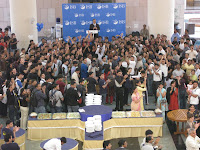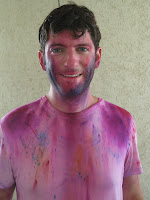





 An earlier Duke-initiated question for the blogs was in regards to starting a business in my host school's country. Immediately, I wanted to highlight the experience of one of my classmates and good friends here at ISB, Dr. Radhika Vasanthakumar.
An earlier Duke-initiated question for the blogs was in regards to starting a business in my host school's country. Immediately, I wanted to highlight the experience of one of my classmates and good friends here at ISB, Dr. Radhika Vasanthakumar. 












 So for all of you Indian readers, you'll have to weigh in on my observations of what the exchange and international students at ISB have taken to calling "the bobble." Never before did I think to write about this confusing gesture/communication technique, but then - twice in one day - I used the bobble!
So for all of you Indian readers, you'll have to weigh in on my observations of what the exchange and international students at ISB have taken to calling "the bobble." Never before did I think to write about this confusing gesture/communication technique, but then - twice in one day - I used the bobble!
















 of Hyderabad." Ty and I went with our new Israeli friends to a western restaurant in the high-end Banjara Hills neighborhood one evening and then went to a local hole-in-the-wall the following night. Night #1 involved salads, cheese plates, and beverages that we haven't enjoyed in several weeks, but it ended in an auto ride that was enough to make us teeter between laughter and tears! We were glad to know, after our driver tested his brakes against an oncoming cement truck, that the vehicle could, in fact, stop rather quickly! Night #2 involved being waited on by a 16-year old named "Nani" who was visibly shaken at the beginning of the meal, stating in a trembling voice, "It is my first time serving foreigners." By the end of the meal though, he'd told us his life story (complete with introductions to his father and grandmother) and was prancing out after us yelling, "Get good grades and come back again!"
of Hyderabad." Ty and I went with our new Israeli friends to a western restaurant in the high-end Banjara Hills neighborhood one evening and then went to a local hole-in-the-wall the following night. Night #1 involved salads, cheese plates, and beverages that we haven't enjoyed in several weeks, but it ended in an auto ride that was enough to make us teeter between laughter and tears! We were glad to know, after our driver tested his brakes against an oncoming cement truck, that the vehicle could, in fact, stop rather quickly! Night #2 involved being waited on by a 16-year old named "Nani" who was visibly shaken at the beginning of the meal, stating in a trembling voice, "It is my first time serving foreigners." By the end of the meal though, he'd told us his life story (complete with introductions to his father and grandmother) and was prancing out after us yelling, "Get good grades and come back again!" 



My initial impression is that the Indian culture is much more formal than the American culture. Although certain areas of Hyderabad are more westernized (e.g., the new airport, Cyderabad, etc.), the city is dominated by a more conservative culture. The predominant religions are Hinduism and Islam, and as such, many of the women dress in full saris or burkhas. As a woman, I think much more about my dress, my speech, and my mannerisms here than I ever do at home. When I leave campus, I wear either pants or long skirts and cover my shoulders – and this would simply not happen in 80 degree, sunny weather in the States! Also, vendors and drivers normally speak to Ty rather than me (despite the fact that I’m way more verbose!), I only occasionally receive a handshake when off campus (whereas men frequently shake hands), and Ty and I are usually one of the few couples walking together through town. Normally, groups of men stay together, even holding hands as they walk, as do the women.
The Indians with whom we have spent time often take tea or coffee with friends in the afternoons and evenings, relaxing in one another’s apartments or homes. Also, “evening” is not the same meaning here as it might be in most U.S. settings. Whereas I am accustomed to having evening meals at 7:00-ish, dinner here is not available until 7:30pm (until 10:00pm). Ty and I are often the first of the ISB students and staff to walk through the café doors at night, stomachs growling as we enter. Also, concerning eating, many of our colleagues at ISB have private cooks and/or maids, and meals, snacks, and tea are often prepared for the students. This is one stark difference from the lives of Fuqua students at Pinnacle Ridge, Alexan Place, Station 9, or The Lofts!
Dinner isn’t the only thing to start late in India! “India time” is a frequent phrase used to dismiss the frequent 15-minute tardiness for meetings, classes, etc. When invited to a 10:00pm school-sponsored party for the new exchange students, I thought that arriving 30 minutes late (“fashionably” – right?!) was appropriate. However, not a single person was at the location (including the organizer), and the party did not really begin until around 1:00! The Midwestern “Early to bed, early to rise” value is not a part of the ISB culture. However, our Muslim friends wake at 5:00 each day for morning prayers – another example of the diversity of people, practices, and norms in this country.
Today, my Managing Complexity course addressed the issues of Indian and American cultural differences in business. (Specifically, we discussed the challenges of implementing a Google-like culture in an Indian business setting.) The comments from my Indian colleagues support the judgment that the culture here is much more formal than that in the U.S. Students mentioned the presence of hierarchical structures between management and lower-level employees (a “sir” culture), a lack of willingness or comfort engaging in honest feedback, and a high level of competition (versus collaboration) among colleagues.
Business Environment
Since arriving in Hyderabad, we’ve witnessed an interesting (and saddening) chain of events unfold in our new city. Satyam, a prominent Indian IT company based in Hyderabad, was accused of fraudulent activity – essentially padding their books with nonexistent funds, claiming to have roughly $1 billion USD when, in reality, they’re accused of not having enough cash to cover their employees’ pay for the previous month. The business world here has been shaken at a national, local, and academic level with the unraveling of this story.
For several days, newspaper headlines, CNBC India, and all of the national news channels and websites addressed the fraud continuously. The CEO resigned almost immediately, but at ISB, our Dean also resigned from his leadership position at our school, as he was a Board member of Satyam. The school was shocked and discussions ensued about how the Indian economy would rebound from the embarrassing international drama, and the similarity of this situation to the Enron scandal in the U.S. has been discussed at length. Even as I write this entry, CNBC is running news about Satyam, two weeks after the initial blow was announced. India is now grappling with how to improve its regulatory frameworks, revisit corporate legislation, and repair its international reputation as a booming, trustworthy player in the global business world.
Another interesting note is that, while attending a panel discussion on technology and strategy by leaders from McKinsey, Deloitte, Accenture, CapGemini, and IBM Consulting, one partner discussed India’s changing competitive position. Whereas I am accustomed to hearing Americans speak about the threat of Indian and Chinese competition, I was not expecting to hear the same sentiments expressed by Indian professionals about emerging Asian economies (e.g., Vietnam). The professionals discussed the inability of the country to continue competing solely as a cost-leader and warned of complacency in the midst of an ever-increasing global competition. It will be really interesting to see how the country defines itself as a unique player in the world market.












